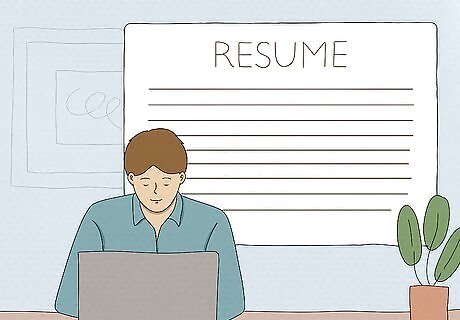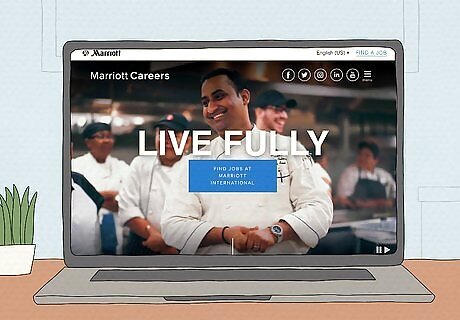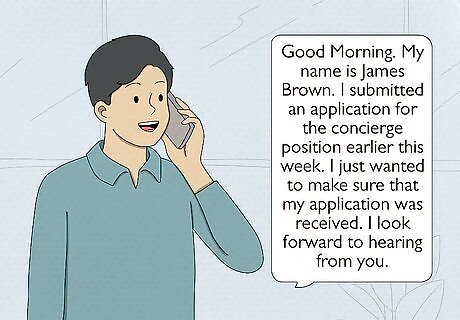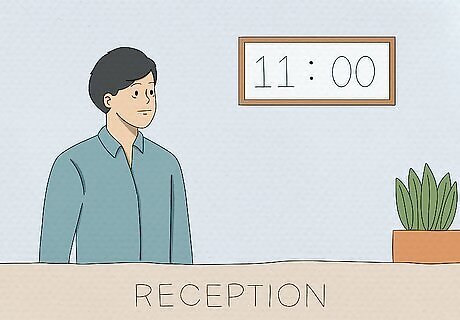
views
Obtaining Skills and Experience

Build a solid work history. Although where you have worked is important, the amount of time you have spent in a given job is important as well. Try to stay with a job for at least three years. Staying with an employer for three to four years shows commitment and stability. Build a solid yet related work history by starting at entry-level hotel positions like technical support, accounts payable, or even dishwashing. Commitment and stability are desirable traits employers look for in hotel workers, especially since hotels like to invest in their employees.

Obtain the necessary skills. Customer service skills are essential in the hotel industry. Secretarial jobs, sales jobs, and restaurant jobs are just a few examples of jobs that can help you develop great customer service skills. However, try to develop specific skills that are relevant to the position you are applying for. If you are applying for a concierge position, for example, try working as a secretary to develop your ability to organize, file, and answer the phone.

Get a hospitality degree if you plan to work in upper management. Obtain an associate's or a bachelor's degree in hospitality from a college or a university. If your goal is to be a manager, or if you want to get into the business side of the hotel industry, then get a bachelor's degree. If you plan to stay on the operational side of the industry, then an associate's degree may only be necessary. However, a hospitality degree isn't necessary for all hotel positions. Some positions may only require solid work experience and/or training such as health and safety training, food safety training, CPR training, or other related training. For example, if you are applying for a lifeguard position, make sure you have CPR training.

Identify potential references. Choose current or previous bosses and superiors who you have developed a good relationship with as your references. Make sure your references can speak to your skills. This way they will be able to sell you to the employer. Make sure to let your references know that you listed them on your resume before or immediately after applying for the job. Also send them information about the position you are applying for.

Create your resume. A great resume doesn't just list what you have done and accomplished, but it convinces the employer that you are the best fit for the position. Create a great resume by outlining the skills, education/training, and job responsibilities that are relevant to the position you are applying for. For example, if you previously had a bartending job and you are applying for a concierge position, then mention your ability to serve and communicate with a wide range of customers.
Locating and Applying for a Job

Find jobs through a job search site. Hotels often recruit employees through job sites like Monster, Indeed, LinkedIn, Glassdoor, and others. These sites are convenient because you can narrow down your search results by selecting your experience level, location, salary requirements, and the type of job you are looking for.

Go to the hotel’s website. Visit the website of two to three hotels you are interested in working at. Look for job openings under the “careers” section in the website. If you can’t find a job opening at one property, see if there is another property in the area. Visit that property’s website to see if they have any job openings.

Visit the hotel in person to find out about job opportunities. Ask the hotel’s concierge about information concerning job openings and where to apply. The concierge will most likely direct you to the hotel manager or assistant manager. They will provide you with a list of job openings and how to apply for them. If job openings are not currently available, ask if you can leave your resume in case one opens up.

Read the job’s description. The description will outline the position’s level, responsibilities, qualifications, and compensation. If your qualifications and skills fit the job’s description, then apply for the job by submitting your resume.

Follow through on your application. After you have submitted your application, call or email the hotel after four or five days. Let the hotel know that you look forward to hearing from them soon. If you get a voicemail, leave your name and number. For example, “Good Morning. My name is Jessica Brown. I submitted an application for the concierge position earlier this week. I just wanted to make sure that my application was received. I look forward to hearing from you.”
Interviewing for the Job

Show your passion for the hotel industry. Employers are looking for employees who are passionate about what they do. Talk about your lifelong interest in the industry, or your passion for customer service. Since many hotels like to invest in their employees, make sure to mention that you hope to develop a career in the industry. For example, "I have had many different jobs throughout the years, but the one thing that has remained constant is my love for developing relationships with customers. From my experience, quality customer service produces loyal customers."

Rehearse your answers to interview questions. Interviewers typically ask questions to understand their applicants’ behavior. They want to know how a potential employee will react to different types of people and handle different situations. Write down your answers to these questions. Your answers should be truthful and to the point. Use relevant examples to support your answers as well. Rehearse them in front of the mirror. Some examples of typical questions are: “Where have you worked previously?” “Why did you leave your previous job?” “What were some obstacles you faced in your last job and how did you handle them?” “Do you tend to solve problems on your own, or ask for help?” “Why would you like to work at this hotel?”

Dress professionally for your interview. Whether you are applying for a lifeguard or a concierge position, you want to dress professionally. As a rule of thumb, dress one to two levels higher than the job you are applying for. Dressing appropriately shows that you want to be taken seriously and care about the job. For example, if you are applying for a housekeeping position, business casual attire is appropriate. If you are applying for a concierge or managerial position, then formal business attire may be more appropriate.
Working in the Hotel Industry

Be open to working night shifts. Hotels operate 24 hours, 7 days a week. Consequently, night shifts are common in the hotel industry. Employees usually take turns working these shifts. Don’t be surprised if you get scheduled to work a night shift once or twice a week. If you cannot handle night shifts, then the hotel industry may not be for you.

Maintain a positive attitude. Because you deal with customers on a daily basis, having a positive attitude is very important. Whether you are a housekeeper, a front desk clerk, a bellhop, or a manager, smiling and greeting patrons will be a part of your job responsibilities.

Be attentive. The ability to read your customers is another important skill hotel workers must have. Pay attention to your clients' body language, tone of voice, and posture. Tailor your services to your clients' needs to satisfy them. For example, if you sense that a client is unhappy due to stiff body language and a curt attitude, then offer the client a complimentary drink or room service to appease them.

Be willing to work your way up. Many managers encourage their employees to learn the hotel business from the ground up. Be prepared to be pulled from your main responsibilities to help out with other things such as busing tables, delivering room service, or tending to guests’ needs. This way, you will have a better understanding and appreciation of the entire industry.


















Comments
0 comment